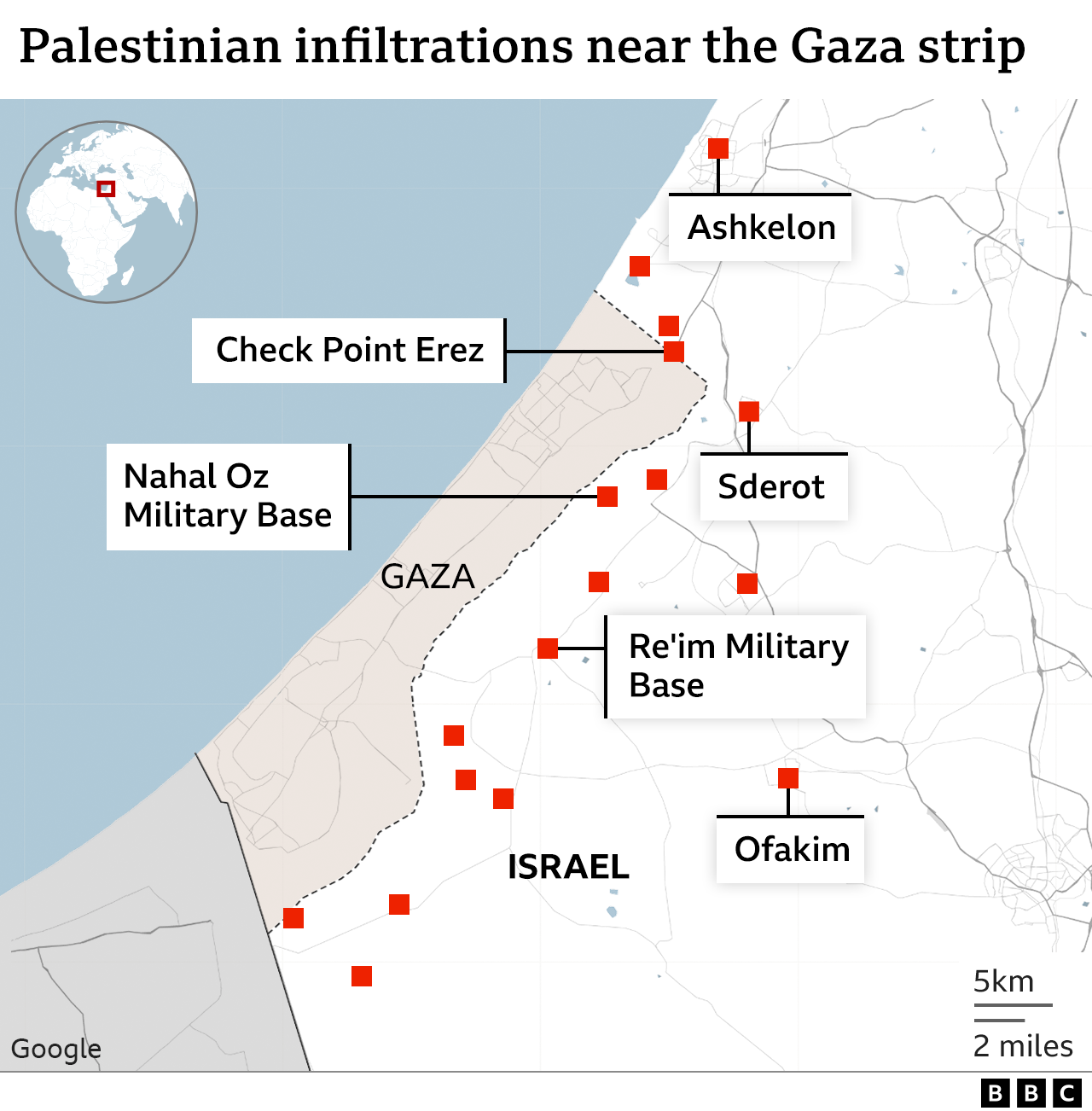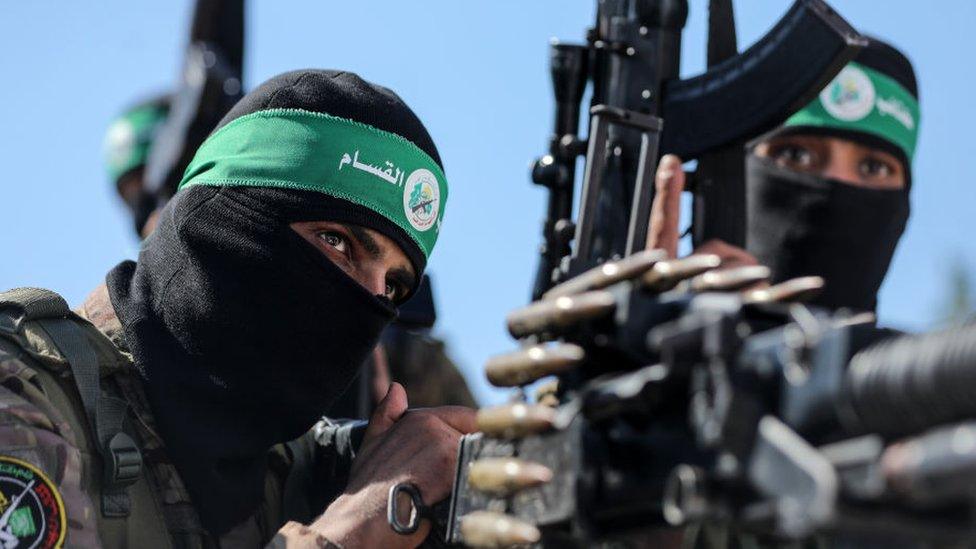Israel attack: PM says Israel at war after 250 killed in attack from Gaza
- Published
Watch: Massive explosion as Gaza high-rises destroyed by jets
At least 250 people are reported killed and 1,590 wounded in Israel after the Palestinian militant group Hamas launched its biggest attack in years.
Dozens of gunmen from Gaza infiltrated southern Israeli communities after dawn under the cover of heavy rocket fire.
They have taken both Israeli soldiers and civilians hostage, and some have been brought back to Gaza.
Israel has responded with a wave of air strikes on Gaza that have killed 232 people and wounded 1,600, medics say.
Prime Minister Benjamin Netanyahu said Israel was "at war" and vowed that Hamas, which rules Gaza, would "pay an unprecedented price".
The Israeli military has mobilised tens of thousands of reservists and is now expected to launch a ground operation in Gaza.
Meanwhile, fighting is continuing with militants who still hold pockets of southern Israel. Barrages of rockets are also being fired at Israeli cities and towns, with Tel Aviv and Rishon Lezion among those hit in the evening.
Israel's nightmare scenario - armed Palestinian militants at large in the south of the country - began early on Saturday, the Jewish Sabbath and the day of the festival of Simchat Torah.
It is believed that dozens of gunmen crossed into Israeli territory in a number of different locations. Some cut through the perimeter fence from Gaza and others entered by sea.
How they managed to penetrate one of the most heavily fortified borders in the world is unclear.
Videos shared on social media showed shooting as the militants arrived in Israeli villages and towns, including the town of Sderot, which is only 1.6km (1 mile) from Gaza.
Watch: Video appears to show Palestinian gunmen in Sderot
People in a number of communities called in to Israeli news stations, saying they were trapped in their homes or were taking cover elsewhere.
"I went out, I saw loads of bodies of terrorists, civilians, cars shot up. A sea of bodies, inside Sderot along the road, other places, loads of bodies," Sderot resident Shlomi said.
The leader of one regional council in southern Israel, Ofir Liebstein, was killed in an exchange of fire with militants when he went to defend his community.
Videos were also shown of Israelis being taken as hostages - an unprecedented development.
Watch: Party-goers recall militant attack
The BBC understands that militants are currently holding dozens of soldiers and civilians. Some were thought to be in some of the small Israeli border towns, while others were taken into Gaza.
Hamas claimed that it had captured 53 "prisoners of war" including senior officers, and that many were being held in tunnels - which have been prime targets for the Israeli military in previous conflicts with militants in Gaza.
An Israeli military spokesman confirmed that "soldiers and civilians" had been abducted, and some soldiers had been killed - including the commander of Israel's Nahal infantry brigade Col Jonathan Steinberg. But he denied reports that a top general had been kidnapped.
Videos were also circulated of Palestinians driving captured Israeli military vehicles in Gaza.

At the same time as the infiltration, militants in Gaza began launching thousands of rockets towards Israel, reaching as far as the cities of Tel Aviv and Jerusalem.
Some rockets evaded Israel's Iron Dome missile defence system and damaged residential buildings and vehicles.
Residents said they did not remember a situation like this for a long time, with streets in Tel Aviv locked down and empty.
"There is a heavy feeling of surprise, of shock and of fear from what is still expected to happen," English author and journalist Gideon Levy told the BBC. "When the first rockets fell, I was still jogging in the park, the noise was terrible."
Watch: Video purportedly shows captured Israeli tank in Gaza
At a meeting of his security cabinet, Israeli Prime Minister Benjamin Netanyahu said: "Our first objective is to clear out the hostile forces that infiltrated our territory and restore the security and quiet to the communities that have been attacked."
"The second objective, at the same time, is to exact an immense price from the enemy, within the Gaza Strip as well. The third objective is to reinforce other fronts so that nobody should mistakenly join this war."
Dozens of Israeli warplanes and other aircraft have been carrying out strikes in Gaza in response to the attack, causing large explosions.
The Israeli military said it targeted 17 Hamas military compounds and four operational headquarters in the first few hours of what it called "Operation Iron Swords".
Later, missiles destroyed the 11-storey Palestine Tower in downtown Gaza City, which houses Hamas radio stations in the rooftop.
The Israeli air force said it struck "military infrastructure in two multi-storey buildings used by senior Hamas terrorist operatives for carrying out terrorist activity", and that it had warned occupants to evacuate before the attack.
Watch: Rockets launched from Gaza streak across sky
Medical aid group Medecins Sans Frontieres said a nurse and an ambulance driver were killed in Israeli strikes on two hospitals in Gaza.
Palestinian news agency Wafa meanwhile reported that 10 civilians were killed in a strike on a residential building in the Shabora area of Rafah, in the south of Gaza.
As night fell, Israel's state-run electricity company also cut the power supply to Gaza. Gaza's power company said about 80% of the territory's electricity had been coming from Israel.
There was also violence in several locations in the West Bank on Saturday. Palestinian medics reported that six Palestinians were shot dead during confrontations with Israeli forces.
Hamas military commander Mohammed Deif called on Palestinians everywhere to join the group's operation.
"We have decided to put an end to these Israeli offences with God's help, so the enemy understands that the time of wreaking havoc without being held accountable is over," he said.
Ismail Haniyeh, the leader-in-exile of Hamas, claimed that Palestinian factions intended to expand the violence to the occupied West Bank and Jerusalem.
Ghazi Hamad, a Hamas spokesman, meanwhile told the BBC that the group had direct backing for the attack from Iran, which pledged to "stand by the Palestinian fighters until the liberation of Palestine and Jerusalem".
Palestinian President Mahmoud Abbas - a political rival of Hamas - said the Palestinian people had the right to defend themselves against the "terror of settlers and occupation troops".
There has been strong international condemnation of the Hamas attacks.
US President Joe Biden called them "unconscionable" and declared that Israel "has the right to defend itself and its people, full stop".
"There's never a justification for terrorist attacks and my administration's support for Israeli's security is rock solid and unwavering," he added.
UN Secretary General António Guterres said he was "appalled by reports that civilians have been attacked and abducted from their own homes".
The UK's Foreign Secretary, James Cleverly, said it "unequivocally condemns the horrific attacks by Hamas on Israeli civilians".
Qatar's foreign ministry said Israel alone was responsible for the ongoing escalation of violence.
Additional reporting by Francesca Gillett.

Are you personally affected by the issues raised in this story? If it is safe to do so, you can get in touch by emailing haveyoursay@bbc.co.uk, external.
Please include a contact number if you are willing to speak to a BBC journalist. You can also get in touch in the following ways:
WhatsApp: +44 7756 165803
Tweet: @BBC_HaveYourSay, external
Please read our terms & conditions and privacy policy
If you are reading this page and can't see the form you will need to visit the mobile version of the BBC website to submit your question or comment or you can email us at HaveYourSay@bbc.co.uk, external. Please include your name, age and location with any submission.
